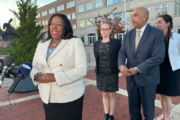Editor’s note: This article is part of a report examining the impact Hong Kong’s National Security Law is having on that territory, countries around the world and China’s geopolitical ambitions.
LONDON — When a three-bedroom rental house recently came on the market in Reading, a small city of around 219,000 residents, some 40 miles west of London, there were 10 inquiries about it in the first week, according to Ricky Bhurji, owner of Sophic Property, a property rental and management company. And seven of the queries came from newly arrived migrants from Hong Kong.
[READ: Hong Kong Crackdown a Part of China’s Larger Strategy]
A wave of thousands of Hong Kong residents who are fleeing a Beijing-instigated crackdown on the city-state’s democratic traditions has started to engulf the United Kingdom. While London is the destination of choice for many of them, smaller cities with more affordable housing, good schools and universities — such as Reading — are also proving popular. “It’s definitely a hot spot,” Bhurji says, “I’m seeing it on the ground all time.”
Most Hong Kong migrants want to rent for six to 12 months before buying, he says. But when they do buy, they tend to not only buy a residence for themselves, but one or two rental properties as investments.
That kind of spending will likely continue, given that the exodus from Hong Kong, which began last year and intensified this January, mainly comprises highly educated, cash-flush professionals. The government estimates they could provide a net gain to the U.K.’s coffers of between £2.4 billion ($3.34 billion) to £2.9 billion ($4 billion).
Nevertheless, there are concerns that the huge number of Hong Kong migrants could spark a backlash if it places pressures on schools, health care facilities and housing.
“When you have a major influx like this, you are going to have problems,” says Steve Tsang, director of the China Institute at the University of London’s School of Oriental and African Studies, who was born in Hong Kong.
The migration was kicked off by a policy announced last year by British Prime Minister Boris Johnson to offer resident visa status to holders of British National Overseas passports, a type of passport unique to some Hong Kong residents who were British nationals at the time of the handover of the former British colony to China in 1997.
The 1984 signing of the Sino-British Joint Declaration led to the handover. The legally binding declaration granted Hong Kong autonomy for 50 years — the so-called “one country, two systems” that China promised to uphold. But Downing Street views new security laws imposed by China and its violent smothering of dissent as an abrogation of the agreement — hence Johnson’s decision to allow holders of the British National Overseas visas — the BNOs, as they’re called — safe haven in Britain.
There are 2.9 million BNO holders and 2.3 million dependents eligible for the scheme, which gives them the right to live, work and study in the U.K. for five years, after which they can then apply for citizenship. The government estimates that up to 322,000 will eventually take up the offer over the next five years.
In the first half of the year, according to the Home Office, 64,900 BNOs applied for the visa. It’s expected that between 123,000 and 153,000 Hong Kongers will arrive in Britain this year.
“At the moment,” Tsang says, those first-year estimates are “in the ballpark, but when you look at the five-year figure, it’s difficult to know.”
Peter W. Walsh, a researcher at the Migration Observatory at the University of Oxford, says it’s too early to say if the half number will prove predictive. “There are too many variables.” The initial tranche may be high because of pent-up demand, but it’s also possible that it’s on the low side because of COVID-19 travel restrictions.
Stephen Kinnock, the Labour member of Parliament who is the shadow minister for Asia, has complained that the BNO application approval process is too slow. In the first quarter, only around 20% had been approved. Kinnock told the South China Morning Post that it was “extraordinary” that so few applications had been processed. Nevertheless, Walsh says he expects that nearly all of the initial 34,000 applications will be approved.
Walsh also doubts if the wave of BNOs will trigger a surge in anti-immigration sentiment in the U.K., noting that 100,000 Hong Kong expatriates already call Britain home “and there is no evidence of xenophobia toward them and they are pretty well integrated.”
Still, the country has a history of reacting badly to large migrations. The last time the U.K. experienced a large influx of migrants was between 2004 and 2012, after the European Union expanded to include countries from Eastern and Central Europe. Thousands of residents from the newly admitted states, including ultimately 600,000 from Poland, headed for the U.K. And while they were largely low-skilled laborers, they too provided a net gain to Britain’s economy. Nonetheless, their arrival in such large numbers generated a strong anti-immigration pushback.
The public’s disdain for immigration peaked in 2015 — a year before the U.K. narrowly approved the Brexit referendum to leave the EU, a vote that was driven by antipathy toward migrants.
Since then, many polls indicate that the public’s attitude toward immigration has greatly softened. Polling for the Migration Observatory found just 13% of Britons say immigration is the main problem facing the county. And a recent Redfield & Wilton Strategies poll found that 49% of the public approved the Hong Kong policy, while just 21% disliked it.
As Walsh notes, “having a migration wave that’s decidedly elite” is a new phenomenon for the U.K. and should help keep tensions low.
[READ MORE: Activists, Families and Young People Flee Hong Kong Following Protests]
That said, there has been a rise in anti-Asian incidents in London and elsewhere in the wake of the COVID-19 pandemic, which originated in China. While Walsh doesn’t expect the BNOs to become targets of racists and xenophobes, he admits that anger over the coronavirus could cause some problems. “There could be a risk exacerbated by COVID.”
Tsang says the bigger worry is a clustering of too many BNOS in too few areas, forcing housing prices to rise, limiting school places and increasing waiting times in local doctors’ offices and hospitals, potential developments that could spark a negative reaction among local residents.
“That’s why we need to encourage them to spread out, rather than congregating in certain parts of cities,” Tsang says.
Property manager Bhurji estimates that the influx of Hong Kong migrants in some parts of Reading has already boosted rental prices by perhaps 15% to 20% in those neighborhoods, which could price out some locals. But he still expects area residents to be welcoming.
“This is a very multicultural area, and I’ve not seen any signs of hostility or anything like that,” Bhurji says.
HongKongers in Britain is one of several grassroots, nonprofit organizations created by Hong Kong expats in the last year to give assistance and advice to the U.K.-bound BNOs. Of the 720 BNOs who responded to an online survey that the group conducted, 22.3% said they were planning to live in London. Manchester placed second, cited by 8.2%. Birmingham and Reading were in third and fourth place, cited by 4.8% and 4.2%, respectively.
London Mayor Sadiq Khan has set aside £900,000 ($1.25 million) to ease BNOs into the city, and issued a statement saying that “they are very welcome in London. Our city has a proud history of being home to people from many different backgrounds, and I am committed to doing all I can to help them settle in London.”
Simon Cheng, cofounder of the Hong Kongers group, says age matters when it comes to deciding where to locate. Younger migrants tend to be urban-oriented and focused on jobs. “And they will prefer London and then Manchester.” Older BNOs with children may opt for less expensive areas with good schools and nearby universities, such as Reading, Bristol and Nottingham.
YouTube influencers and local media reporting and ads may also have an effect on where in Britain BNOs opt to house-hunt. A June article in the South China Morning Post, for example, stressed that cities such as Manchester and Cambridge offered more affordable housing than London.
Downing Street has set aside a 43 million British pounds ($60 million) fund it will parcel out to local governments to help them resettle the migrants, including money for English language support and housing assistance. It’s also set up 12 virtual Welcoming Hubs that offer information on registering for schools and health care. But Tsang says the government should also develop “a better coordinated national scheme” to ensure a more even distribution of BNOs across the UK. “I haven’t seen that yet.”
Cheng says his group would encourage BNOs not to cluster into just a few areas.
“We hope they will be integrated into the entire society,” Cheng says. “But we can’t control that. They have the freedom to choose where they want to live.”
And a desire to retain their freedoms is, of course, ultimately what’s motivating them to uproot their lives from Hong Kong for a new future in Britain.
More from U.S. News
Hong Kong Crackdown Is Part of China’s Larger Global Strategy, Experts Say
Activists, Families and Young People Flee Hong Kong
Photos: Hong Kong Protests Carrie Lam’s China Extradition Bill
Hong Kong Residents Moving to the United Kingdom After China Crackdown originally appeared on usnews.com







